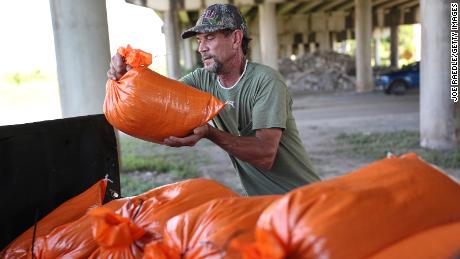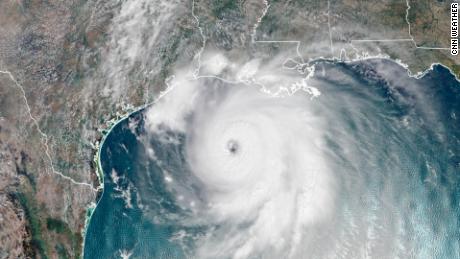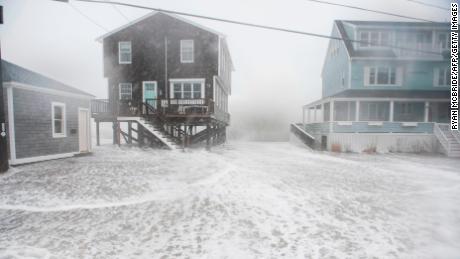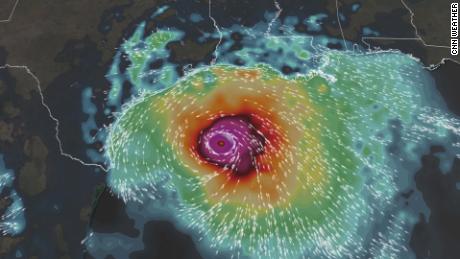Laura threatens ‘unsurvivable’ storm surges
A Category 5 hurricane has never hit the coast of that state, CNN meteorologist Brandon Miller said. Hurricane Katrina had that strength in the Gulf but was downgraded before it made landfall in 2005.
Laura was moving over the Gulf of Mexico with maximum sustained winds of 150 mph, about 90 miles south of Lake Charles, Louisiana, and it could strengthen even more before making landfall near the Texas border, forecast for shortly after midnight local time.
Water levels along the Louisiana coast were rising rapidly Wednesday evening as Category 4 Hurricane Laura threatened potentially devastating winds and “unsurvivable storm surge” to the border with Texas, the National Hurricane Center said.
Water levels along the central and western Louisiana coastline were running three to four feet above normal tide levels.

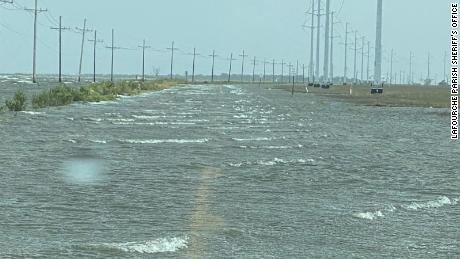
Storm surge flooded state highway 1 in Golden Meadow, Louisiana, Wednesday.
“I wouldn’t be surprised if it makes landfall as a Category 5,” CNN meteorologist Jennifer Gray said. “This is not a storm we want to mess with.”
Major flooding topple 100-year record

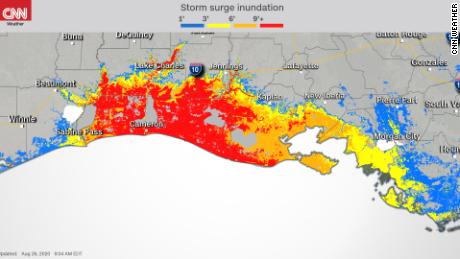
Storm surge began to push in by Wednesday morning and will continue to get higher as landfall approaches. Here are the forecast surge heights.
The surge could reach 40 miles inland, with floodwaters not receding for several days, according to the National Weather Service.
Major flooding expected across Lake Charles through Thursday morning will likely topple a 100-year record, forecasters said.
The Calcasieu River, which runs through Lake Charles, is forecast to rise to 15.6 feet by morning — surpassing the previous record of 13 feet on October 1, 1913.
With the river at 13 feet, “over half of the city of Lake Charles is flooded,” according to the National Weather Service. The river gauge is currently around 4.5 feet. It reached 11 feet during Hurricane Ike in 2008.
“Catastrophic, life-threatening,” NHC Director Ken Graham told CNN about the storm’s potential.
“Every little bayou, every little river that normally drains your rain, is going to flow in the opposite direction with storm surge,” he said. “And it (will get) out of those banks and (go) over the land.”
Eugene Island, in southern Louisiana, reported 3.2 feet of inundation above ground level, and wind gusts over 40 mph, according to the National Weather Service.
Conditions were to deteriorate in the evening, with widespread tropical storm-force-winds followed by hurricane-force winds around midnight ET through daybreak. Rising water levels will likely peak in the early morning.
More than 1.5 million people are under some type of evacuation order across parts of Texas and Louisiana ahead of Laura, which killed at least nine people when it raked parts of the Caribbean as a tropical storm earlier this month.
The Houston area — especially eastern Harris County — also should expect damaging winds. Road tolls there have been waived to help people leaving the area, Gov. Greg Abbott said.
A hurricane warning extends from the Galveston area — as well as parts of Harris County just east of Houston — to Intracoastal City, Louisiana, south of Lafayette.
Houston is under a tropical storm warning, meaning strong winds — up to 73 mph — are expected.
“Trees will come down. Power lines will come down … especially in the eastern part of Houston proper,” CNN meteorologist Chad Myers said.
Thousands flee the coast
People have been flocking away from coastal parts of Texas and Louisiana that are in Laura’s path.
“We got up this morning, and then mama, she was like, ‘We got to evacuate,'” said Howard Amos. “So we started packing our clothes, and now we’re here (in Austin).”
Preparations also were underway Wednesday in Houston, hit hard by Hurricane Harvey just three years ago.
Houston is particularly vulnerable to flooding and could see big impacts from Laura. The concrete-filled city has notoriously poor drainage systems and a propensity to flood, such as during the overwhelming rainfall from Hurricane Harvey in 2017.
The Johnson Space Center in Houston said it closed Wednesday to all but essential personnel, and NASA transferred command of the International Space Station from that center to facilities in Alabama and elsewhere in Texas.
In Port Arthur, about 90 miles east of Houston, officials imposed an 8 p.m. to 6 a.m. CT curfew on top of a earlier mandatory evacuation order.
“It shall be unlawful for any person to remain, walk, run, stand, drive or ride upon any public place in the city … during this state of emergency,” according to the order by Mayor Thurman Bill Bartie.
“This storm is going to be packing a real big punch,” Bartie told CNN.
Police Chief Timothy Duriso, in a Facebook post, pleaded with residents “to evacuate immediately.” An earlier post said the Port Arthur Fire Department will leave Sabine Pass ahead of the storm, “depending on conditions,” and police plan to stay “as long as weather conditions allow.”
Jefferson County also imposed a curfew, from 10 p.m. to 6 a.m. CT.
In Bolivar Peninsula, northeast of Galveston, about 40 residents that were riding out the storm were urged to evacuate by Galveston County Judge Mark Henry. The judge told reporters that while the county may be spared the worst of the storm, the peninsula will likely be without power for days.
“We’re trying to avoid congregate sheltering,” said Mike Steele, spokesman for the governor’s office of emergency preparedness.
The entire Louisiana National Guard has been activated, Gov. John Bel Edwards said, because “we … believe that there will be extensive search and rescue after this storm.”
“People need to heed the warnings they have been given and evacuate,” he said.

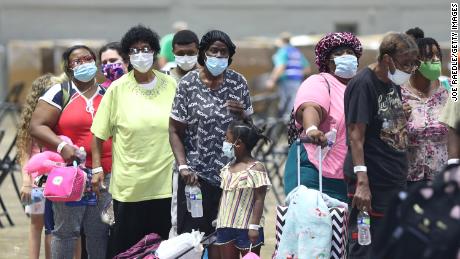
People stand in line as they prepare to board a bus as they are evacuated by government officials in Lake Charles, Louisiana, on Tuesday.
In southwestern Louisiana’s Calcasieu Parish, which includes Lake Charles, officials temporarily evacuated all prisoners — more than 900 of them — to facilities further inland, the sheriff’s office said.
The parish, home to about 200,000 people, was among those in Laura’s forecasted path. Officials pleaded with people to heed a mandatory evacuation order.
“We expect a catastrophic event from this storm,” Lake Charles Mayor Nic Hunter said at a news conference Wednesday.
Laura’s outer bands already were dropping rain on a large stretch of Louisiana.
In Lafourche Parish, between New Orleans and Houma, water was overtopping Louisiana HIghway 1 south of the Golden Meadow Floodgates on Wednesday morning, Parish President Archie Chaisson said.
“We’re anticipating LA 1 to be underwater for the next 24 hours,” Chaisson said.
Though that area was outside the hurricane warning area, storm surges of 4 to 7 feet are possible there, forecasters said.

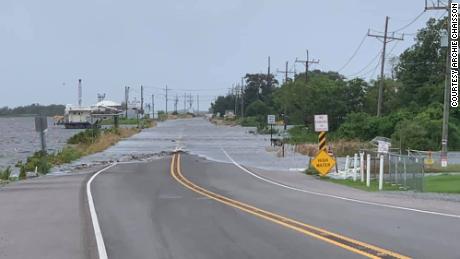
Parts of Louisiana Highway 1 were flooded Wednesday morning.
In Cameron, Louisiana, Maranda Brown, 43, a lifelong resident, told CNN that she and her family were evacuating the coastal town for Shreveport.
“I packed my life in a Kia Optima,” said Brown, who said she lost homes to Hurricanes Ike and Rita in 2008 and 2005. “We’ll go home to nothing.”
Brown believes Laura will be more devastating. She didn’t even bother boarding up her home. “Ain’t going to do any good,” she said.
“Everyone that I know is kind of numb,” said Brown, who lives with her parents and two other family members. “It’s awful to have to deal with this.”
Storm surges, damaging winds and tornadoes are among the threats
When Laura makes landfall, destructive winds will be one of the big problems. A Category 4 storm would mean winds at least 130 mph near the center — strong enough to destroy homes and knock out power for weeks.
But the storm’s eyewall isn’t the only place to watch.
“Hurricane-force winds … are also expected to spread well inland into portions of eastern Texas and western Louisiana,” the NHC said.
Even before landfall, winds of tropical-storm force — 39 mph and greater — should reach the area of the Texas-Louisiana state line, perhaps by 2 p.m. CT, Myers said.

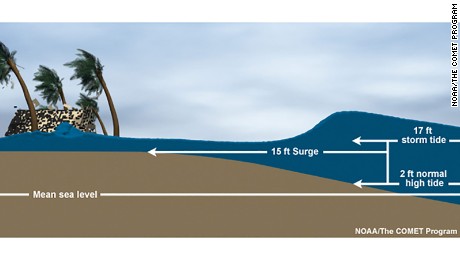
Threats include storm surges of:
• 15 to 20 feet along a 55-mile stretch of coastal Louisiana from Johnson Bayou to Rockefeller Wildlife Refuge
• 10 to 15 feet from Texas’ Sea Rim State Park to Louisiana’s Johnson Bayou, and from the Rockefeller Wildlife Refuge to Louisiana’s Intracoastal City
• 8 to 12 feet from Intracoastal City, Louisiana, to Morgan City, Louisiana
• 6 to 9 feet from Port Bolivar, Texas, to Sea Rim State Park, Texas
• 4 to 7 feet from Morgan City, Louisiana, to the mouth of the Mississippi River.
From Wednesday through Friday, Laura is expected to produce rainfall of 5 to 10 inches, with isolated maximum amounts of 15 inches, across parts of northwestern Gulf Coast.
Over the lower to middle Mississippi Valley, 2 to 4 inches of rainfall with isolated totals of 6 inches are expected, the NHC said.
Laura’s impending arrival comes as the Gulf Coast avoided a powerful storm in Marco, which significantly weakened before reaching the US.

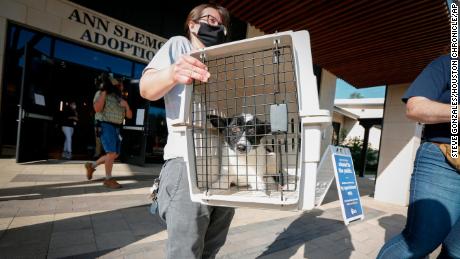
Katy Gay carries a dog as the Houston SPCA sent about 25 dogs and over 100 animals total to the Austin Humane Society as Hurricane Laura threatens the Texas coast.
More than 3,000 members of the Louisiana National Guard and more than 1,000 Texas Guard troops were prepared to provide support by land, water and air, officials said.
Deaths in the Caribbean
At least nine people have died in the Caribbean, including several in the Dominican Republic and Haiti, due to Laura.
The victims include a 7-year-old boy who died along with his mother after a wall collapsed in their home in the Dominican Republic. Another person died after a tree fell on a house.
Dominican Republic President Luis Abinader said an army corporal was killed while helping with rescue efforts in Pedernales province.
Five people were killed in Haiti, including a 10-year-old girl, the country’s civil protection agency said.
CNN’s Amanda Watts, Leyla Santoago, Devon Sayers, Paul P. Murphy, Eric Levenson, Judson Jones, Haley Brink and Theresa Waldrop contributed to this report.
![]()



